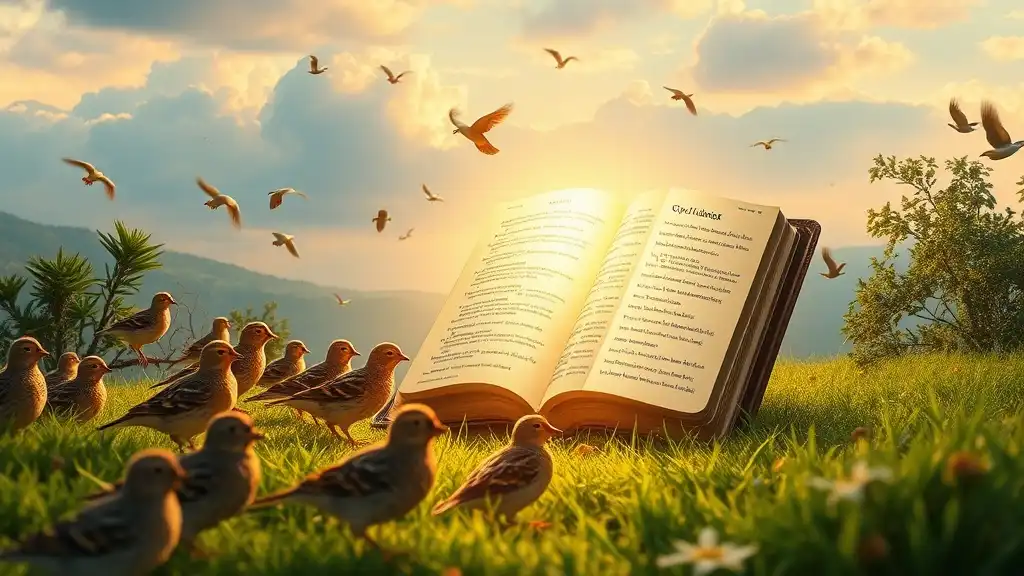The significance of animals in the Bible often offers deep spiritual insights into themes of provision, sustenance, and divine care. Among these creatures, the quail holds particular importance, symbolizing not only physical nourishment but also profound spiritual lessons that resonate through the ages.
The Quail in the Old Testament
The Provision of Quail: Exodus 16
In the book of Exodus, the Israelites find themselves wandering in the wilderness after their liberation from Egypt. Hungry and desperate, they cry out to God for sustenance. In response, God provides quail as a miraculous gift, demonstrating His power to care for His people even in their most challenging times. This event marks a pivotal moment in their journey, showcasing the transition from slavery to freedom and the dependence on divine grace.
Symbolism of Quail in Exodus
The appearance of quail is not merely about filling stomachs; it represents God’s unconditional love and provision. It serves as a powerful reminder that during times of uncertainty, we are not alone; we can rely on divine support. Quail, in this context, symbolizes nourishment — not just in the physical sense, but also emotionally and spiritually. As the Israelites feasted on the quail, they were reminded of their connection with God and the covenant they shared. They learned to trust in God’s promises, understanding that even in their journey through the desert, they would receive what they needed.

Spiritual Lessons from the Quail
Abundance in Times of Need
The narrative surrounding the provision of quail teaches us that even when life seems bleak, abundance is often just around the corner. In our personal lives, periods of hardship can cloud our vision, making it difficult to see potential blessings. The quail acts as a spiritual metaphor for finding light and prosperity in dark times. It encourages us to trust that God has a plan and is capable of addressing our needs, albeit sometimes in ways that we do not expect.
In moments of despair, it may help to remind ourselves that, like the Israelites, we can turn our focus inward, reflecting on instances when our needs were met in surprising ways. This lesson emphasizes the importance of faith and resilience, encouraging us to cultivate a mindset that anticipates abundance even in scarcity.
The Quail and Gratitude
The episode of quail also teaches us about the importance of gratitude. When we receive blessings, big or small, we must acknowledge them and express thanks. The Israelites, after consuming the quail, were called to reflect on their journey and the miracles they had witnessed.
Gratitude shifts our focus from lack to sufficiency. It fosters a spirit of appreciation, encouraging us to recognize God’s hand in our lives. Developing a practice of thanksgiving can transform our perspectives and deepen our spiritual connections. The quail symbolizes all the blessings we may overlook, urging us to count them and nurture a life filled with gratitude.

The Quail in the New Testament
Allusions to Quail in Jesus' Teachings
While quail is not explicitly mentioned often in the New Testament, the themes surrounding sustenance and divine provision continue. Jesus often spoke of food, using it as a metaphor for spiritual nourishment. He referred to God’s care in the Sermon on the Mount, where He pointed to the birds of the air and emphasized, “If God cares for them, how much more will He care for you?”
This parallels the lessons learned from the quail: God’s concern encompasses all His creation, and just as He provided for the Israelites, He will meet our needs through love and grace.
Implications for Modern Spirituality
In today's fast-paced world, the message surrounding quail remains relevant. As we navigate our spiritual journeys, we encounter challenges that test our faith. However, the story of the quail invites us to pause and recognize that God can provide in surprising, unexpected ways. This is not just a historical lesson but a timeless reminder that abundance and provision are ever-present for those who remain open to divine guidance.

Quail as a Symbol of Freedom
The Role of Quail in the Journey to the Promised Land
As the Israelites journey toward the Promised Land, the quail represents more than sustenance; it embodies freedom. The nutritional source signifies leaving behind the life of slavery and stepping into a promised future filled with hope and possibility.
Quail can symbolize our own personal freedoms. Just as the Israelites had to embrace their new life, we too are called to acknowledge and step into the areas of our lives where we are free to grow, learn, and thrive.
Connections to Personal Spiritual Journeys
Reflecting on the quail prompts us to explore our journeys toward personal freedom. Each of us is on a path—sometimes marked by trials and tribulations—that ultimately leads to spiritual growth. Recognizing the quail along the way allows us to celebrate small victories and acknowledge the sustenance we receive from our spiritual practices, relationships, and insights. It encourages us to break free from limitations and to embrace the nourishment necessary for our growth.

Conclusion
The quail, as presented in the Bible, carries rich spiritual meanings that extend beyond its role as mere sustenance. It serves as a cornerstone of lessons revolving around abundance, gratitude, and freedom. Reflecting on the quail encourages us to identify moments in our lives where divine provision has manifested and invites us to consider how we can cultivate gratitude and trust in our daily experiences.
In a world sometimes clouded by chaos, the story of the quail provides a roadmap for finding hope, sustenance, and freedom on our spiritual journeys. Let us remain open to recognizing God’s gifts and embrace the beauty of divine provision in our lives, allowing these lessons to illuminate our paths.



















